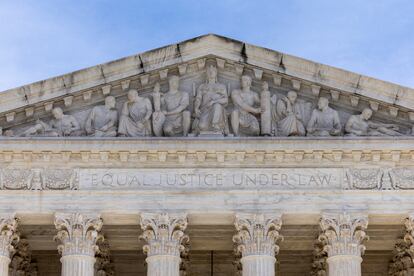GOP-led states want to regulate posting on social media. The Supreme Court will decide if they can
Laws signed in Florida and Texas in 2021 aimed to address conservative complaints that the social media companies were liberal-leaning and censored users based on their viewpoints, especially on the political right

The Supreme Court is taking up challenges to state laws Monday that could affect how Facebook, TikTok, X and other social media platforms regulate content posted by their users. The cases are among several this term in which the justices could set standards for free speech in the digital age.
The court is hearing arguments over laws adopted by Republican-dominated legislatures and signed by Republican governors in Florida and Texas in 2021. While the details vary, both laws aimed to address conservative complaints that the social media companies were liberal-leaning and censored users based on their viewpoints, especially on the political right.
The cases are among several the justices have grappled with over the past year involving social media platforms. Next month, the court will hear an appeal from Louisiana, Missouri and other parties accusing administration officials of pressuring social media companies to silence conservative points of view. Two more cases awaiting decision concern whether public officials can block critics from commenting on their social media accounts, an issue that previously came up in a case involving then-President Donald Trump. The court dismissed the Trump case when his presidential term ended in January 2021.
The Florida and Texas laws were passed in the months following decisions by Facebook and Twitter, now X, to cut Trump off over his posts related to the Jan. 6 attack on the U.S. Capitol by his supporters.
Trade associations representing the companies sued in federal court, claiming that the laws violate the platforms’ speech rights. One federal appeals struck down Florida’s statute, while another upheld the Texas law.
In a statement when he signed the bill into law, Florida Gov. Ron DeSantis said the measure would be “protection against the Silicon Valley elites.”
When Gov. Greg Abbott signed the Texas law, he said that it was needed to protect free speech in what he termed the new public square. Social media platforms “are a place for healthy public debate where information should be able to flow freely — but there is a dangerous movement by social media companies to silence conservative viewpoints and ideas. That is wrong, and we will not allow it in Texas,” Abbott said.
But much has changed since then. Elon Musk purchased Twitter and, in addition to changing its name, eliminated teams focused on content moderation, welcomed back many users previously banned for hate speech and used the site to spread conspiracy theories.
The Biden administration is siding with the challengers. Lawyers for Trump have filed a brief in the Florida case urging the court to uphold the state law.
Several academics and privacy advocacy groups told the court that they view the laws at issue in these cases as unconstitutional, but want the justices to preserve governments’ ability to regulate social media companies to some extent.
Sign up for our weekly newsletter to get more English-language news coverage from EL PAÍS USA Edition
Tu suscripción se está usando en otro dispositivo
¿Quieres añadir otro usuario a tu suscripción?
Si continúas leyendo en este dispositivo, no se podrá leer en el otro.
FlechaTu suscripción se está usando en otro dispositivo y solo puedes acceder a EL PAÍS desde un dispositivo a la vez.
Si quieres compartir tu cuenta, cambia tu suscripción a la modalidad Premium, así podrás añadir otro usuario. Cada uno accederá con su propia cuenta de email, lo que os permitirá personalizar vuestra experiencia en EL PAÍS.
¿Tienes una suscripción de empresa? Accede aquí para contratar más cuentas.
En el caso de no saber quién está usando tu cuenta, te recomendamos cambiar tu contraseña aquí.
Si decides continuar compartiendo tu cuenta, este mensaje se mostrará en tu dispositivo y en el de la otra persona que está usando tu cuenta de forma indefinida, afectando a tu experiencia de lectura. Puedes consultar aquí los términos y condiciones de la suscripción digital.








































